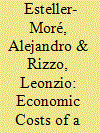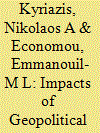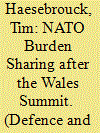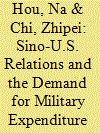|
|
|
Sort Order |
|
|
|
Items / Page
|
|
|
|
|
|
|
| Srl | Item |
| 1 |
ID:
186523


|
|
|
|
|
| Summary/Abstract |
This paper examines many instances of the same investment game to explore the questions of how violence affects trusting and trustworthy behaviors and how those behaviors affect a country’s level of violence or peacefulness. Average responses of players in the investment game are compared across countries experiencing varying degrees of peacefulness or conflict. The primary finding is that a macroeconomic peace index can predict trusting behavior but has no effect on trustworthy behavior. Trustworthiness, on the other hand, affects peacefulness. It is necessary, then for policymakers to foster trust and trustworthiness among individuals in order to maintain peace, and they must work to rebuild macroeconomic institutions to restore trust, to repair communities, and to revitalize economies after conflict.
|
|
|
|
|
|
|
|
|
|
|
|
|
|
|
|
| 2 |
ID:
186522


|
|
|
|
|
| Summary/Abstract |
Due to the pro-independence demands of part of its electorate, the political fit of Catalonia within Spain has given rise to notable political tensions over the last few years. This conflict has progressively affected several dimensions of Catalan society, including, potentially, the economy. The illegal referendum on independence, held in October 2017, marked the climax of political and social tensions, leading to a Constitutional crisis and further stoking the conflict as opposed to offering any hope of an early resolution. We analyze a complete set of margins potentially affected by the referendum, including real (aggregate demand and supply) and financial responses. Using a synthetic control method, we find strong evidence of the outflow of short-term bank deposits after the referendum; while, on the real side, we find evidence of responses in aggregate supply (number of capital increases and number of new firms registered).
|
|
|
|
|
|
|
|
|
|
|
|
|
|
|
|
| 3 |
ID:
186525


|
|
|
|
|
| Summary/Abstract |
This paper sets out to explore whether the Turkish geopolitical uncertainty exhibits significant linkages with fluctuations in the Turkish lira (TRY) values against other currencies. The period examined covers the Erdoğan administration (March 2003 up to the present). The innovative geopolitical uncertainty index by Caldara and Iacoviello and modern GARCH methodologies are adopted in order to explore how geopolitical risk influences currency values and the overall economy during this turbulent period. Econometric outcomes reveal that geopolitical uncertainty leads to devaluation of TRY against the US dollar, the Swiss franc and the Swedish krona but in a non-significant manner whereas mixed results emerge concerning the impacts of macroeconomic or financial variables.
|
|
|
|
|
|
|
|
|
|
|
|
|
|
|
|
| 4 |
ID:
186521


|
|
|
|
|
| Summary/Abstract |
At the 2014 Wales Summit, the NATO allies pledged to spend at least 2% of their GDP on defence by 2024. While some allies are on track to meet the 2% target, others only modestly augmented their military expenditures and still others have even reduced their defence budgets. This article aims to explain the diverging trajectories of the allies’ military expenditures during the first five years after the Wales Summit. More specifically, it introduces an integrated burden sharing model, which is tested with generalized set Qualitative Comparative Analysis. The results of the analysis indicate that the threat posed by Russia provided the most important incentive for increasing defence budgets. However, general budget constraints kept some allies from increasing their defence budget in proportion to the threat posed by Russia. Conversely, in the absence of budget constraints, allies governed by a right-leaning executive made intermediate budget efforts even if they only faced a low level of threat. Strikingly, budget inertia only had a modest impact on the allies’ defence budgets, only resulting in a low level of spending in allies that were not threatened by Russia and either faced considerable budget constraints or were governed by a left-wing government.
|
|
|
|
|
|
|
|
|
|
|
|
|
|
|
|
| 5 |
ID:
186524


|
|
|
|
|
| Summary/Abstract |
This study examines the impact of natural resource rents on terrorism via inequality channel in 34 African economies, straddling the period 1980–2012. This study employs a negative binomial regression, in which the following findings are established: first, the unconditional impact of natural resource rents on terrorism is found to be positive across the model specifications, particularly when Gini and Theil indices are controlled for. Second, inequality has no discernable first-order impact on terrorism across the board. Third, the marginal impacts of interactions between inequality measures, specifically Gini and Theil coefficients and total natural resource rents on terrorism are significantly negative. Four, the corresponding net effects of interactions between natural resource rents and inequality (Gini and Theil coefficients) on terrorism are positive, thus lending support to earlier submission of involving all constitutive variables in the specifications for the parameters to make economic sense. The results are robust to accounting for fixed and country effects using the Poisson Pseudo maximum likelihood high-dimension fixed effects estimator. On the policy front, maintaining fairness and equity in the distribution of rents from the ‘free gifts of nature’ remains a veritable policy menu, especially for the resource-rich economies, to counteracting terrorist activities.
|
|
|
|
|
|
|
|
|
|
|
|
|
|
|
|
| 6 |
ID:
186526


|
|
|
|
|
| Summary/Abstract |
This paper examines the demand for military expenditure in eighteen selected Indo-Pacific countries for the years 1993–2018. As the dominant powers, the U.S. and China characterize the geopolitical structure of the Indo-Pacific region. Sino-U.S. relations are newly quantified by measuring the number of cooperative and conflict events between China and the United States based on the Global Database of Events, Language, and Tone (GDELT). After incorporating Sino-U.S. relation variables into neoclassical demand models, the panel data estimating results reveal that the increasing number of confrontations from the United States toward China has lead to increases in non-U.S. allies’ military expenditure while the rise in China confronting the United States has not. U.S. allies in the Indo-Pacific region have tended to increase military expenditure when the United States increases its pressure on China. The empirical results provide evidence that Sino-U.S. relations affect the level of military expenditure in the Indo-Pacific Region.
|
|
|
|
|
|
|
|
|
|
|
|
|
|
|
|
|
|
|
|
|